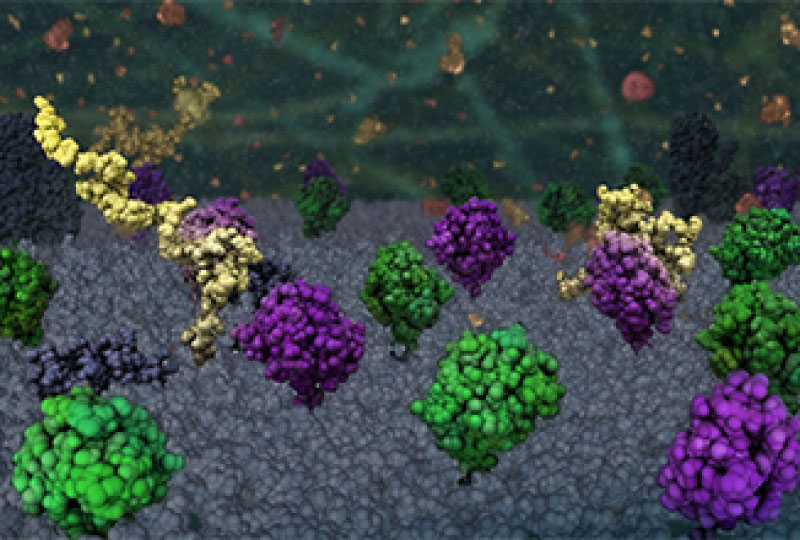Scientists in Australia have developed a small molecule compound that can prevent a form of cell death known as apoptosis, and which could ultimately lead to new treatments that minimize cellular damage after heart attack, help to preserve organs for transplantation, or hold back the progression of degenerative diseases. The new “cell death blocker”, developed by researchers at the Walter and Eliza Hall Institute of Medical Research, demonstrated exceptional ability to keep laboratory-grown cells alive and healthy.

“Never before have we seen such promising ability to intervene in the earliest stages of apoptosis before irreversible damage occurs,” commented Guillaume Lessene, PhD, head of the Institute’s new medicines and advanced technologies unit. Lessene, and co-research leads David Huang, PhD, a laboratory head at the Institute’s blood cells and blood cancers division, and Benjamin Kile, PhD, who is now head of anatomy and developmental biology at the Monash Biomedical Discovery Institute, together with first author on the paper, Mark van Delft, PhD, and colleagues, report their developments in Nature Chemical Biology, in a paper titled, “A small molecule interacts with VDAC2 to block mouse BAK-driven apoptosis.”
Apoptosis is a form of tightly regulated cell death that plays an important role in normal tissue development and function. The process is controlled by the BCL-2 family of proteins, some of which promote cell survival, while others trigger cell death. Intentionally activating apoptosis using small molecules represents a promising, and clinically validated approach to cancer therapy, the authors noted. “The realization that apoptosis is essential for tissue homeostasis and that its deregulation underpins many disease states has motivated a number of drug development efforts. Progress has been made in inducing apoptosis in tumor cells …”. In contrast, attempts to prevent the loss of healthy cells by blocking apoptosis have demonstrated less success. To date, scientists have focused on targeting caspases, but, as the team noted, “they act too late in apoptosis to provide long-term protection … They accelerate, but are not required for, cellular demise. Accordingly, results from clinical trials with caspase inhibitors have been disappointing.”
In contrast with noncritical caspases, two proteins, BAK and BAX, are involved in a key stage of cell death known as the “point of no return.” Cells are committed to die once either BAK or BAX is activated. “The critical step in committing a cell to death is activation of BAK or BAX, pro-death BCL-2 proteins mediating mitochondrial damage,” the team noted. “Apoptosis cannot proceed in their absence.”
Building on this knowledge the researchers carried out a screen of 250,000 small molecule compounds to identify candidates that might block apoptosis at a stage that preserves cell survival. “We set out to test the hypothesis that a more effective strategy to block apoptosis pharmacologically would be before caspase activation,” they stated. The screen highlighted a novel tricyclic sulfone, WEHI-9625, and analogs, which prevented intrinsic apoptosis and preserved cells that were otherwise destined to die. “In laboratory models we found we could override apoptosis and keep cells functioning,” Kile noted.
The team’s laboratory studies showed that WEHI-9625 acted to block mouse (murine) BAK (mBAK), not BAX. Subsequent studies using CRISPR technology to knock out candidate mitochondrial proteins with which BAK might interact indicated that the protein VDAC2 was required to mediate the activity of WEHI-9625 on BAK function, with experiments indicating that WEHI-9625 acts by enhancing VDAC2:BAK interaction. “These data all suggest that the interaction between BAK and VDAC2 is critical for the ability of WEHI-9625 to block BAK activation,” the authors wrote. “BAK is thought to interact with VDAC2 in healthy cells but dissociate during apoptosis … We postulate that WEHI-9625 may convert VDAC2 to a more effective negative regulator of mBAK by stabilizing the VDAC2/mBAK complex and rendering the two proteins unable to dissociate.”
The laboratories that carried out the research have established the Walter and Eliza Hall Institute’s National Drug Discovery Centre as a drug discovery facility for scientists in Australia. The institute has more than 30 years of experience in cell death research, starting back in the late 1980s with the discovery that BCL-2 could prolong cancer cell survival. This finding helped to direct development of the BCL-2 inhibitor venetoclax (ABT-199) as anticancer therapy for leukemia.
The latest research could help to inform the development of new approaches that hold back, rather than promote apoptosis. “Acute injury can cause cells to die rapidly leading to the loss and weakening of tissues and muscles. In such circumstances, being able to prevent uncontrolled cell death could improve a patient’s recovery, or even their chances of survival,” Huang said. “We have shown it is possible to halt the biochemical cascade that triggers cell death, right at the point where it begins,” Kile added.
The team commented that their research results expand on the key role of VDAC2 in regulating apoptosis, and demonstrate that “blocking apoptosis at an early stage is both advantageous and pharmacologically tractable.” The interaction between VDAC2 and BAK has long been considered a potential drug target, they commented, and it’s been suggested that small molecules that are able to disrupt this interaction might make effective apoptosis activators. “Our unbiased small molecule phenotypic screen again highlights the importance of this interaction and has uncovered the first compounds able to modulate it. However, rather than disrupting the interaction to promote apoptosis, the WEHI-9625 series instead appears to stabilize the interaction between VDAC2 and BAK and thereby prevent apoptosis … These first-in-class inhibitors will serve as useful tools both to better understand the enigmatic role of VDAC2 in regulating mBAK and to evaluate the impact of blocking mBAK-driven apoptosis in experimental models.”



